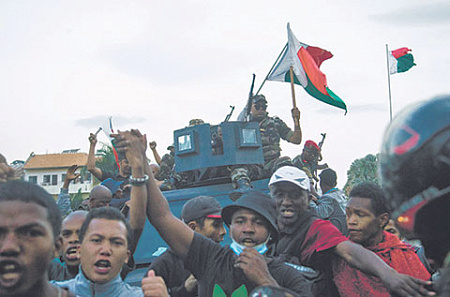
Madagascar is grappling with a profound political crisis following the dramatic flight of President Andry Rajoelina amidst widespread protests and a subsequent military takeover. What initially appeared to be a clear-cut military coup or popular revolution has devolved into a complex and uncertain power struggle, with the ousted president now asserting his authority from an undisclosed location abroad. The situation has thrown the Indian Ocean island nation into constitutional limbo, raising significant concerns about its future stability and democratic governance.
The crisis escalated rapidly after weeks of mounting public discontent. Protests erupted across Madagascar from late September, fueled primarily by persistent grievances over chronic power and water supply shortages. These domestic frustrations were compounded by allegations of widespread irregularities in the 2023 presidential elections, which saw Rajoelina re-elected for a second term after a controversial earlier tenure as transitional leader between 2009 and 2014. The convergence of these issues swiftly eroded public trust and governmental legitimacy.
As the military began to openly side with the burgeoning protest movement, President Rajoelina reportedly departed the country on October 13, potentially utilizing a French military aircraft. Despite his absence, he swiftly moved to retain control, announcing via social media on October 14 his decision to dissolve the National Assembly. This move preempted a planned extraordinary session by parliamentarians who intended to initiate impeachment proceedings against him. Rajoelina has since affirmed his intention to continue governing from abroad, citing security concerns and claiming an assassination plot, while also stating his remote efforts to secure vital equipment for the island’s energy infrastructure.
In a direct challenge to Rajoelina’s claims, the military, which had earlier disrupted a planned presidential address on national television, declared on October 15 that it was formally seizing power. General Demosthenes Picolas, the Chief of Staff, subsequently asserted the army’s responsibility for restoring peace and order across Madagascar. The military followed this by announcing the dissolution of all state institutions, with the notable exception of the lower house of parliament, which then proceeded to formally impeach the absentee president, seemingly under military coercion.
The unfolding events have drawn international attention, particularly regarding France’s nuanced position. Reports suggest Rajoelina, who holds French citizenship, may have sought refuge in Dubai with alleged assistance from France. However, French President Emmanuel Macron, when questioned about Rajoelina’s fate at a summit in Egypt, deliberately avoided direct comment. Macron instead emphasized the importance of upholding constitutional order and institutional continuity in Madagascar for regional stability, a statement interpreted by many as a cautious acknowledgment of the delicate situation and France’s historical ties and influence in its former colony.
The current standoff is not Rajoelina’s first encounter with political adversity; he notably lost military support in 2014 only to return to power five years later. This history suggests a potential for future comebacks, despite his current isolation. However, the defection of the elite Capsat army unit, instrumental in his initial rise in 2009, signals a significant loss of his power base. With Madagascar now effectively under military rule, and the military leadership indicating an unwillingness to tolerate Rajoelina’s long-term governance, the question of whether France or the wider international community will tolerate this latest military intervention and its implications for democratic norms in Africa remains a critical, unanswered question.
